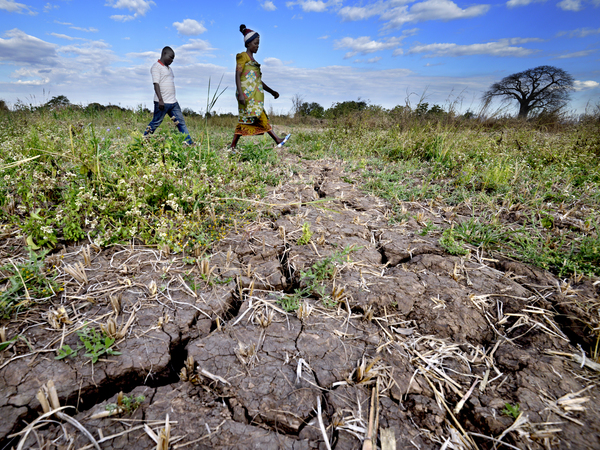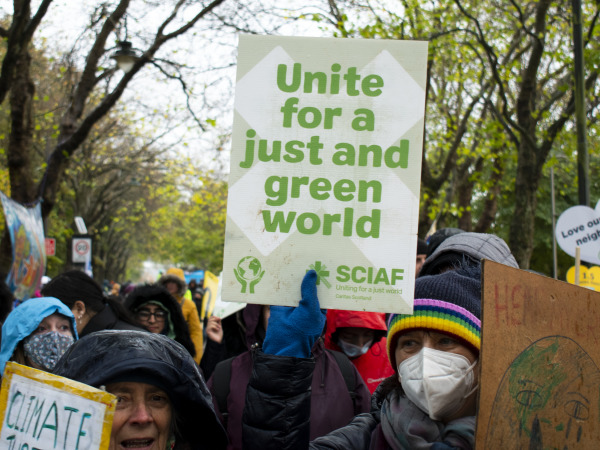Valuing the Invaluable – stories behind Non-Economic Loss and Damage
8 August 2023

SCIAF Programme Manager Ciara Commins writes about the people behind the Loss and Damage headlines. This is part two of a multi-part blog exploring the concept of non-economic loss and damage. You can read the first blog here.
Lots more of us know about Loss and Damage these days, especially since COP 27, but what about the people behind the headlines? How do floods, droughts and cyclones impact on people’s lives, culture and wider society? Non-Economic Loss and Damage specifically refers to the impact of climate change on people’s lives, culture and society. This blog explores some lived experiences from Malawi.
Not only are Malawi’s cyclones and tropical storms more frequent these days, they’re also more intense. Since early 2022, three devastating cyclones and tropical storms of record-breaking magnitude have rocked the southern African nation.
In 2022, the Scottish Government allocated £500,000 to implement a project addressing both economic and non-economic climate-induced losses and damages in Malawi. The funding was awarded to SCIAF, working with Trocaire, Civil Society Network for Climate Change (CISONECC), Churches Action Relief and Development (CARD) and the Catholic Commission for Development in Malawi (CADECOM) in Zomba.
People were also invited to express their lived experiences through a number of art forms such as theatre, music, Umunthu circles, and photojournalism, engaging Art and Global Health Centre (ArtGlo) to explore these.
The programme was implemented in 10 Group Village Head (GVH) areas in Nsanje and Zomba Districts. Village heads are prominent people in their communities and therefore had a prominent place in our work in Malawi – here’s what they told us:
Loss of sacred sites
In GVH Chawesa, Zomba, it’s not just the living who are affected by Loss and Damage – it’s also bringing harm to their dead. Due to increasing intensity and frequency of flooding of the Phalombe river, sacred sites such as cemeteries are under threat. Their graveyard, established more than 200 years ago, is at risk of being washed away by the floods and is now only five metres away from the river.
When flooding occurs, graves are silted over making them difficult to find and family members are unable to visit and pay their respects to their loved ones. Flooding also leaves the earth saturated for weeks after the event, meaning there are times that the community is unable to bury their lost loved ones. This goes against the cultural norm of burying the dead swiftly and entering the grieving process.
Group Village Headman Mwaliwa fears that the loss of the cemetery could have a lasting impact on the community. He said:
“This graveyard is the place where our forefathers are sleeping and we hold it so dear to our hearts. However, the annual flooding is posing a threat to us losing it completely one day.
"The cemetery is the only place where our ancestors are buried. If it's destroyed, we lose a connection to our past. We won't be able to honour our ancestors or pass on their stories to future generations."
Mwaliwa added:
“We tried to plant reeds and trees the previous rainy season, but they are all gone…. we cannot even talk about moving it because that is almost impossible. The loss cannot be replaced.”
Loss of healthcare
In Zomba, the floods are taking their toll on healthcare and in particular pregnant women and new mothers. There’s a new health centre in GVH Magoli but staff can’t set up their practices, meaning pregnant women need to travel far from home to access care in the Mtiya Health Centre. Again, due to frequent flooding, the condition of the roads has deteriorated leading to long uncomfortable journeys for pregnant women, especially during labour. A number of women have had to deliver en-route to hospital with support from “azamba”, traditional birth attendants.
“Over the past three years I have managed to support more than six women, some even in the camps during floods like these,” explains one of the traditional birth attendants.
Floods both take and affect lives.
These stories show the ripple effect of flooding - firstly impacting roads, the knock-on effect to healthcare, leading to complications when new life comes to these communities. From the cradle to the grave – literally – the changing climate is wreaking havoc in Malawi, and across the world. The consequences are devastating. And those countries who did the least to cause the crisis, are suffering the most.
This is loss and damage.

Read part one of the Loss and Damage series, written by Head of Advocacy, Ben Wilson.

This short guide explains Loss and Damage and why progress is crucial.